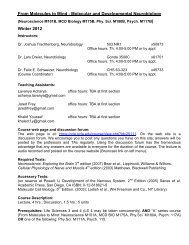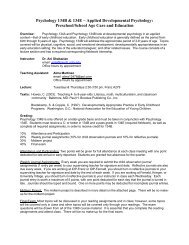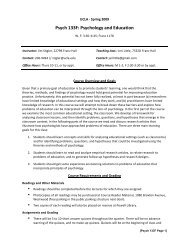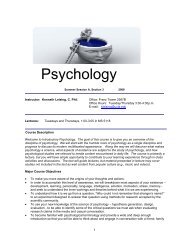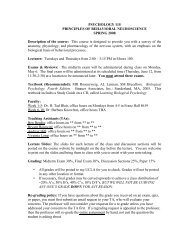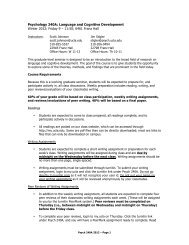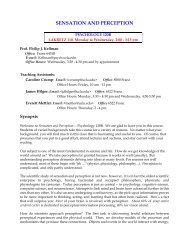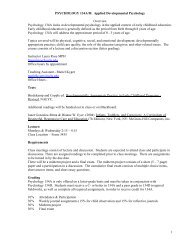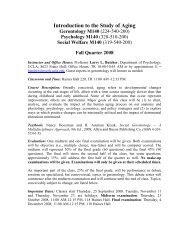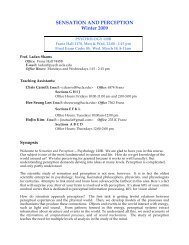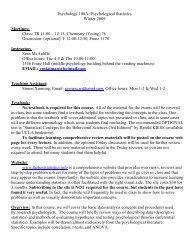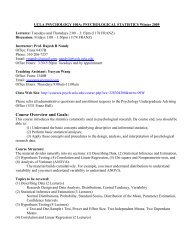Syllabus - Courses in Psychology - UCLA
Syllabus - Courses in Psychology - UCLA
Syllabus - Courses in Psychology - UCLA
You also want an ePaper? Increase the reach of your titles
YUMPU automatically turns print PDFs into web optimized ePapers that Google loves.
<strong>Psychology</strong> 135: Introduction to Social <strong>Psychology</strong>W<strong>in</strong>ter, 2011Moore 100, Wednesday/Friday 1:00-2:15 pmProfessor: Dr. Benjam<strong>in</strong> R. Karney Office: Franz Hall Rm. 4560E-mail: karney@psych.ucla.edu Office Hours: Wed., 2:30-3:30Phone: 310-206-3925 Fri., 2:30-3:30Teach<strong>in</strong>g Assistant: Meghan Meyer Office: Franz Hall 6556E-mail: mlmeyer@ucla.edu Office Hours: Monday, 4:00-5:00Tuesday, 11:00-12:00Teach<strong>in</strong>g Assistant: Erica Hornste<strong>in</strong> Office: Franz Hall 4552DE-mail: erica.hornste<strong>in</strong>@gmail.com Office Hours: Wed., 10:00-11:00Fri., 10:00-11:00Undergraduate TA: Tomas Frymann Office Hours: Tue. 5-6 <strong>in</strong> Kerckhoff Coffee HouseE-mail: tfrymann@ucla.edu Virtual Office Hours: Wed. 7-10Book Chapter reviews: Wed. 12-1, location TBAOverviewI believe social psychology to be the most important course taught at any university.Social psychology is the scientific study of how our behaviors, thoughts, and emotions areaffected by the real or imag<strong>in</strong>ed presence of other people. That is a broad def<strong>in</strong>ition thatencompasses a wide range of phenomena, <strong>in</strong>clud<strong>in</strong>g: how people form attitudes, how peopleattempt to persuade and are persuaded by others, how people form close relationships, whypeople help or harm each other, and how people understand each other and themselves. Thetheories and ideas we will discuss <strong>in</strong> this course apply to almost every aspect of our day-to-daylives, and thus, when the course has ended, my hope is that it will be impossible to view thesocial world <strong>in</strong> the same way as when the course began.Required:TextsGilovich, Keltner, & Nisbett. (2010). Social <strong>Psychology</strong> (Second Edition). New York:W.W. Norton.This text is held on reserve at Powell Library. I will refer to it as the GKN text.page 1
AssignmentsThe material of this course will be presented through assigned read<strong>in</strong>g, lectures,discussion sections, and exams. All are designed to comb<strong>in</strong>e for the fullest experience of thiscourse. Here’s some more detail about each of these.Read<strong>in</strong>g: For most of the lectures, there is required read<strong>in</strong>g from the Gilovich, Keltner,& Nisbett (GKN) text. Do the assigned read<strong>in</strong>g. This is the ma<strong>in</strong> way to understand the materialof this course. The read<strong>in</strong>g associated with each week of lectures is described <strong>in</strong> this syllabus,and you will notice that the topics do not follow the organization of the textbook. You areadvised to have the read<strong>in</strong>gs done before the lectures for that week. You are responsible for allof the material <strong>in</strong> the textbook, even if it was never discussed <strong>in</strong> class or sections.Lectures: Attend these. The purpose of the lectures is to amplify, expla<strong>in</strong>, demonstrate,and expand on the material <strong>in</strong> the text. Naturally, there will be some overlap between the textand the lectures, but there will be a substantial amount of material that is unique to each. Thelectures will assume that you have already done the read<strong>in</strong>g for the week, so your understand<strong>in</strong>gof each lecture will be best if you have done the read<strong>in</strong>g first. Class periods will not all be filledwith me talk<strong>in</strong>g. There may be the occasional film clip, demonstration, or discussion.Slides for each lecture will be posted before the lecture at the course web site:https://ccle.ucla.edu/course/view/11W-PSYCH135-1All lectures will also be video recorded. Those record<strong>in</strong>gs will be available fordownload<strong>in</strong>g a day or two after the lecture, from this web site: www.bru<strong>in</strong>cast.ucla.eduYou are responsible for the material of each class meet<strong>in</strong>g, whether or not youattend.Discussion Sections: Discussion sections are designed to make the material of thiscourse come alive. They are a chance for you to experience and talk about the issues of thiscourse <strong>in</strong> a way that is not possible <strong>in</strong> a large lecture. Unlike lectures, we will be tak<strong>in</strong>gattendance <strong>in</strong> sections, and attendance is mandatory. Saunter<strong>in</strong>g <strong>in</strong>to class late does notguarantee that your attendance will be recorded – the TAs have the right to reduce yourdiscussion grade on the basis of tard<strong>in</strong>ess, so please show up on time. Together, attendance <strong>in</strong>sections is worth about 13% of your f<strong>in</strong>al grade.Writ<strong>in</strong>g Assignment: Shortly after the midterm, there will be a 3-page writ<strong>in</strong>gassignment due at the beg<strong>in</strong>n<strong>in</strong>g of Week 8. Details about this assignment are provided on thelast two pages of this syllabus, but the general idea will be to use the material of the course toanalyze a social psychological phenomenon as it occurs <strong>in</strong> your own life. The writ<strong>in</strong>gassignment will be worth 20% of your f<strong>in</strong>al grade.Exams: There will be two of these, a midterm and a f<strong>in</strong>al exam. The f<strong>in</strong>al exam will notbe comprehensive and will be held on the last day of class, not dur<strong>in</strong>g f<strong>in</strong>als week. Both examswill be multiple choice. Together, these exams will account for 66% of your grade (33%each), so do the best you can on them.page 2
Some people do not like multiple choice exams, and I can understand their feel<strong>in</strong>gs. Toallow for the fact that it takes some students a bit of time to adjust to my style of exam questions,I will distribute some sample questions prior to each exam to give you a flavor of how I writethese th<strong>in</strong>gs.What will the exams test? The emphasis <strong>in</strong> the exams will be on ideas, theories, andresearch more than on names, dates, and statistics. The exams will draw equally from bothtexts and the lectures, which means I will be ask<strong>in</strong>g loads of questions about material that I neverdiscussed <strong>in</strong> class. You can expect some questions about def<strong>in</strong>itions, research designs, theories,and results, but most of the questions will ask you to apply the materials of this course to somereal world situation. These applied questions are crucial to assess<strong>in</strong>g the goals of the course: toget you to view the world outside the classroom differently.One more th<strong>in</strong>g: I have put a lot of effort <strong>in</strong>to design<strong>in</strong>g the tests used <strong>in</strong> this course, andif I want to use them aga<strong>in</strong> then I cannot allow you to keep them. The teach<strong>in</strong>g assistants keepall of the exams and answer sheets. If you want to see your exam after the grades are posted(and I strongly encourage you to do so), then you will want to visit your teach<strong>in</strong>g assistant dur<strong>in</strong>goffice hours or make an appo<strong>in</strong>tment.About miss<strong>in</strong>g exams: No make-up exams will be allowed without documentation ofillness, death <strong>in</strong> the family, or other suitably traumatic event. If you must miss an exam for oneof these reasons, documentation is required at least 24-hours before the day of the exam. If forsome reason you cannot provide documentation before the exam, then you must contact the<strong>in</strong>structor with<strong>in</strong> 24-hours after the exam. If you miss the exam and fail to contact the <strong>in</strong>structorwith<strong>in</strong> this time period, you will not be allowed to take a make-up exam under anycircumstances. A warn<strong>in</strong>g: if for some reason you do end up tak<strong>in</strong>g a make-up exam, the<strong>in</strong>structor reserves to right to create a new exam for you, and that exam may be <strong>in</strong> the form of anessay test. My advice? Do not miss an exam.About show<strong>in</strong>g up late for an exam: Do not be late for an exam. If you arrive aftersomeone else has already f<strong>in</strong>ished the test and left the room, you will not be allowed to take theexam.Extra CreditYou have the opportunity to earn 2 extra credit po<strong>in</strong>ts by participat<strong>in</strong>g <strong>in</strong> an experimentthrough the <strong>Psychology</strong> Department Subject Pool. Serv<strong>in</strong>g as a subject <strong>in</strong> an experiment providesstudents with direct exposure to psychological research. By participat<strong>in</strong>g <strong>in</strong> experiments, youwill have the opportunity to contribute to on-go<strong>in</strong>g research at <strong>UCLA</strong> while gett<strong>in</strong>g an <strong>in</strong>sideglimpse of how research studies are conducted.One credit is given for every hour of experiment participation. If you complete 2 hour(s)of experiment(s), you will have 2 po<strong>in</strong>ts added to your f<strong>in</strong>al grade at the end of the quarter.The post<strong>in</strong>g and schedul<strong>in</strong>g of experiments is handled via the <strong>Psychology</strong> DepartmentSubject Pool system at http://ucla.sona-systems.com/. More <strong>in</strong>formation on how to use thesystem can be found at http://www.psych.ucla.edu/undergraduate/subject-pool-experimentparticipation.NOTE: Before sign<strong>in</strong>g up for experiments, you MUST select the course for which youpage 3
want your experiment credits to count. All experiments must be completed by March 15, 2012(Thursday of 10th Week).Policy on Academic DishonestyIn this class, academic dishonesty means: (1) cheat<strong>in</strong>g on exams, and (2) plagiarism <strong>in</strong>your written assignments.Cheat<strong>in</strong>g on ExamsIt is your responsibility to know the behaviors that constitute cheat<strong>in</strong>g, but cheat<strong>in</strong>g onexams comes <strong>in</strong> two forms: (1) Communicat<strong>in</strong>g with others, either verbally or nonverbally, as away of shar<strong>in</strong>g <strong>in</strong>formation dur<strong>in</strong>g an exam; (2) Br<strong>in</strong>g<strong>in</strong>g <strong>in</strong> some sort of aid, such as notes, toassist you dur<strong>in</strong>g the tak<strong>in</strong>g of an exam. To help facilitate honest test tak<strong>in</strong>g, I will require thatall cell phones be shut off and put away, all tables cleared, and all hats to be removed, dur<strong>in</strong>g allexams.PlagiarismPlagiarism is the presentation of the ideas, op<strong>in</strong>ions, or the writ<strong>in</strong>gs of others as though itwere your own. Plagiarism is steal<strong>in</strong>g. It is dishonest, unethical, and illegal.Plagiarism can occur <strong>in</strong> a number of ways, some more obvious than others. For example,if you simply copy someone else’s written assignment and present it as your own, that is a clearcutcase of plagiarism. Also, if you use the exact language of someone else without plac<strong>in</strong>g thewords <strong>in</strong> quotation marks and nam<strong>in</strong>g the orig<strong>in</strong>al author, you are clearly committ<strong>in</strong>g plagiarism.You are also committ<strong>in</strong>g plagiarism, however, if you take someone else’s arrangement ofmaterial or pattern of thought and present it as your own, even if you express it <strong>in</strong> your ownwords.The above examples of plagiarism should not make you th<strong>in</strong>k that you cannot use theideas of other people. Indeed, the communication of ideas from one person to another is one ofthe pr<strong>in</strong>ciple ways that science progresses. However, there are correct and <strong>in</strong>correct ways ofus<strong>in</strong>g the ideas of other people. The above examples are <strong>in</strong>correct ways.To use the ideas of someone else correctly, you must be sure to give credit to theorig<strong>in</strong>ator of the idea. For example, if you take a quotation word-for-word from another source,you must use quotation marks and name the author or authors of the orig<strong>in</strong>al source. Even if youare paraphras<strong>in</strong>g an idea from another source, rather than us<strong>in</strong>g an exact word-for-word quote,you must still give credit to the orig<strong>in</strong>al author or authors from whom you are paraphras<strong>in</strong>g theidea.As long as you give proper credit to the ideas of others, however, you can use and buildupon those ideas <strong>in</strong> your own work and writ<strong>in</strong>g. If you are unsure if what you are do<strong>in</strong>g mightbe plagiarism, please ask your TA well <strong>in</strong> advance of turn<strong>in</strong>g <strong>in</strong> your assignment. Plagiarism isnot difficult to detect, and we have at our disposal sophisticated software tools for detect<strong>in</strong>gplagiarism.Consequences of Academic DishonestyAny evidence of academic dishonesty will be dealt with accord<strong>in</strong>g to the procedures ofthe Office of Student Affairs and the <strong>UCLA</strong> polices on academic <strong>in</strong>tegrity. To the extent that the<strong>in</strong>structor has some flexibility on how to respond, this <strong>in</strong>structor will respond very, very harshly.page 4
Can we correspond with you by email?Yes, email is f<strong>in</strong>e when personal contact or an office visit is not possible. Please do notask questions via email that require a long and detailed response (e.g., “Can you expla<strong>in</strong>…” or“What did I miss?”). If you do send an email, be sure it comes directly from you, and please<strong>in</strong>dicate the course number <strong>in</strong> the subject l<strong>in</strong>e of the email.Can I call you on the telephone?No, email is better, because then we both have a record of what was discussed.Can I get a PTE number if the class is full?Core courses are over-enrolled to compensate for the typical drop rate. For this reason,PTE numbers will not be issued for this course. Students with concerns should be directed to the<strong>Psychology</strong> Advis<strong>in</strong>g Office. Neither the professor nor the TAs are <strong>in</strong> charge of distribut<strong>in</strong>g PTEnumbers. All that said, the course has never ever been full, and I have never once turned an<strong>in</strong>terested student away.Can I switch sections?Not easily. In general, you must attend the discussion section <strong>in</strong> which you are enrolled.If you cannot attend your scheduled section, you must f<strong>in</strong>d an alternate open discussion sectionor another student with whom you can switch. Switch<strong>in</strong>g can be done <strong>in</strong> the Advis<strong>in</strong>g Office andMUST be done by the end of the second week of the quarter.I have a disability. Can I make special arrangements to take this class?The professor is committed to work<strong>in</strong>g with the Office for Students with Disabilities torespond to provide equal access to this class for all students. Special services must be approvedby the OSD coord<strong>in</strong>ator and can be accessed by complet<strong>in</strong>g the appropriate service request form.Service guidel<strong>in</strong>e <strong>in</strong>formation is available at the OSD web site: http://www.osd.ucla.edu.Will there be review sessions before the exams?Yes, and they will typically be held after lecture at the class meet<strong>in</strong>g before the exam.Will you distribute a study guide for the exams?Yes, and it will typically be distributed the week before each exam or at the reviewsession.Will slides for each lecture be available on l<strong>in</strong>e?Yes. The professor will make every effort to post the slides on the course web site priorto each lecture.page 6
Can I arrange a make-up exam if I have a lot of other exams on the same day?No. If you are concerned about hav<strong>in</strong>g too many exams on the same day, you shouldconsider dropp<strong>in</strong>g this class.Will you be offer<strong>in</strong>g Honors Sections?Not this quarter.May I use a foreign language dictionary on the exams?Yes, but only under four conditions: (a) only books are allowed, not electronicdictionaries, and the books may not have any papers or writ<strong>in</strong>g <strong>in</strong> them of any k<strong>in</strong>d; (b) youmay only use a dictionary <strong>in</strong> which English words are translated <strong>in</strong>to the same words <strong>in</strong> yournative language. You are not allowed to use a dictionary that gives a def<strong>in</strong>ition of the word,either <strong>in</strong> English or your native language; (c) you must show the professor or the TA yourdictionary before the exam; (d) you must sit <strong>in</strong> the front row dur<strong>in</strong>g the exam.What happens if my paper is late?No extensions on the paper deadl<strong>in</strong>e will be given. If you fail to hand a paper <strong>in</strong> by thedeadl<strong>in</strong>e you will receive a zero.Who grades the papers?The papers are graded by teach<strong>in</strong>g assistants, under the professor’s supervision, us<strong>in</strong>g ahighly structured grad<strong>in</strong>g scheme that corresponds closely to the assignment sheet itself.Can the TA give me feedback on my paper before I hand it <strong>in</strong>?The TA is available to help answer any questions you have about how to complete thewritten assignment. However, this does not extend to read<strong>in</strong>g over the actual text you havewritten as this would give some students an unfair advantage on this assignment.What happens to uncollected papers and exam materials?Uncollected papers and all exam materials are shredded one month after the f<strong>in</strong>al exam.This means that any questions you have about your grades must be raised with<strong>in</strong> one month afterthe f<strong>in</strong>al exam.page 7
<strong>Syllabus</strong>WEEK DATE TOPIC READINGSWeek 1: January 11 Why Social <strong>Psychology</strong>? GKN Chapter 1January 13 Methods GKN Chapter 2No discussion sections.Week 2: January 18 The Law of Social Impact GKN Chapter 8January 20Social InfluenceNo discussion sections due to Monday’s holiday.Week 3: January 25 Group Behavior GKN Chapter 14January 28 No lecture! GKN Chapter 3Discussion section #1: Social InfluenceWeek 4: February 1 Attribution Theory GKN Chapter 4February 3 Cognition & Well-be<strong>in</strong>g GKN Chapter 5Discussion section #2: The effects of pre-exist<strong>in</strong>g knowledgeWeek 5: February 8 Attitudes GKN Chapter 6February 10MIDTERMNo discussion sections, but there will be a review after Wednesday’s class.Week 6: February 15 Prejudice GKN Chapter 12February 17 Persuasion GKN Chapter 9Discussion section #3: Jane Elliotpage 8
<strong>Syllabus</strong> (cont<strong>in</strong>ued)WEEK DATE TOPIC READINGSWeek 7: February 22 Central and peripheral process<strong>in</strong>g GKN Chapter 7February 24 Attraction and Intimacy GKN Chapters 10, 11No discussion sections due to Monday’s holiday.Week 8: February 29 Help<strong>in</strong>g GKN Chapter 13March 2AggressionDiscussion section #4: Attraction(WRITING ASSIGNMENT DUE MONDAY, 10:00am)Week 9: March 7 Violence and the MediaMarch 9 Social <strong>Psychology</strong> and the Law GKN Chapter 15Discussion section #5: Help<strong>in</strong>g and Hurt<strong>in</strong>gWeek 10: March 14 ConflictMarch 16FINAL EXAMNo discussions sections, but there will be a review after Wednesday’s class.page 9
<strong>Psychology</strong> 135: Introduction to Social <strong>Psychology</strong>W<strong>in</strong>ter, 2012WRITING ASSIGNMENTTopicWe talk a lot <strong>in</strong> this course about how people gather <strong>in</strong>formation and draw conclusionsabout the social world. For this brief writ<strong>in</strong>g assignment, I would like you to th<strong>in</strong>k about howthe specific cognitive processes, heuristics, and biases that we discuss <strong>in</strong> the course have affectedyour own th<strong>in</strong>k<strong>in</strong>g. Please identify from your own experience a time when you made asignificant error <strong>in</strong> a social judgment. This could be draw<strong>in</strong>g a mistaken conclusion aboutsomeone, believ<strong>in</strong>g someth<strong>in</strong>g you later realized was false, behav<strong>in</strong>g <strong>in</strong> a way that you laterrealized was misguided, or anyth<strong>in</strong>g else. IMPORTANT: Be sure that the error was the result ofsome facet of social cognition/motivated reason<strong>in</strong>g/<strong>in</strong>formation process<strong>in</strong>g (rather than, forexample, simply hav<strong>in</strong>g <strong>in</strong>correct <strong>in</strong>formation). In other words, the error should have been theresult of the natural motivational and cognitive processes we talk about <strong>in</strong> class. The goal of thispaper is to use your understand<strong>in</strong>g of social cognitive processes to expla<strong>in</strong> why this erroroccurred.OrganizationYour paper must have the follow<strong>in</strong>g sections, clearly labeled.Section 1: Describe your error <strong>in</strong> judgment. What happened, and how did you discoveryour error? (5 po<strong>in</strong>ts)Section 2: Expla<strong>in</strong> three specific cognitive mechanisms that contributed to this error. Beconcrete, use terms from the course, def<strong>in</strong>e them, and use specific examples to illustrate howthese processes and biases affected you. For example, if you wanted to talk about the availabilityheuristic, you would need to def<strong>in</strong>e it and then show exactly how it was operat<strong>in</strong>g <strong>in</strong> yourexperience and how it contributed to your judgment error. (15 po<strong>in</strong>ts)Section 3: What does this experience tell you about how the world works? Do you seeexamples of other people mak<strong>in</strong>g the same error? Discuss how these same mechanisms operatemore generally <strong>in</strong> the world, and how these errors might be avoided. (5 po<strong>in</strong>ts)FormatThe last five po<strong>in</strong>ts are simply for follow<strong>in</strong>g the format correctly. Papers must be typedand double-spaced and no more than three pages long. Use 12 po<strong>in</strong>t Times New Roman font(i.e., this font). No title page, just pr<strong>in</strong>t your name and the section day and time <strong>in</strong> the top rightcorner of the first page. (You can title the paper, if you wish). Please allow one-<strong>in</strong>chmarg<strong>in</strong>s at the top, bottom, and sides of each page so the graders can write comments ifnecessary.page 10
About reference lists: we do not need one for this paper. We will assume that you havebeen read<strong>in</strong>g the textbook, and that it <strong>in</strong>forms your th<strong>in</strong>k<strong>in</strong>g for this paper. That is the wholepo<strong>in</strong>t, so don’t worry about citations and bibliographies. Just expla<strong>in</strong> an experience and showhow much you know.Due DateAll papers must be pr<strong>in</strong>ted out and submitted through TurnItIn by 10:00 AM on Mondayof Week 8 of the course. No late papers will be accepted. Seriously, the web site will not let yousubmit a late paper, so do not even th<strong>in</strong>k about it. That web site is cold, man.How to Submit through Turn-It-In:Step 1. Log onto My<strong>UCLA</strong> and scroll down to your Study List for the current termStep 2. Click on the “TurnItIn” l<strong>in</strong>k for the class. This l<strong>in</strong>k will take you directly to yourclass portfolio page on the TurnItIn.com websiteStep 3. Click on the “submit” icon for the assignment you wish to turn <strong>in</strong> and the“submit” w<strong>in</strong>dow will open for that specific assignmentStep 4. You can upload your file as a Word document.Step 5. Click Submit. After you click submit, a new w<strong>in</strong>dow will open display<strong>in</strong>g yourdigital receipt. Your digital receipt is the confirmation that your submission has beensuccessfully completed.Tips on Writ<strong>in</strong>gWrit<strong>in</strong>g brief essays is challeng<strong>in</strong>g, and you should approach the paper with this <strong>in</strong> m<strong>in</strong>d.Try to write as efficiently as possible. You want to be clear, but at the same time don't wastespace by us<strong>in</strong>g unnecessary words to make a po<strong>in</strong>t or by talk<strong>in</strong>g about someth<strong>in</strong>g that isn't reallyrelevant to your argument. Do<strong>in</strong>g so will prevent you from mak<strong>in</strong>g important arguments ordescrib<strong>in</strong>g someth<strong>in</strong>g more fully <strong>in</strong> another section of the paper, and thereby hurt<strong>in</strong>g your grade.One way to approach these papers is to write a draft and then revise it repeatedly, edit<strong>in</strong>g it untilit is concisely and clearly written. If you are uncerta<strong>in</strong> about what you have written, have a friendread your writ<strong>in</strong>g first. Then have your friend tell you what your paper is about. If your frienddoes not understand your paper, you have some revis<strong>in</strong>g to do.One purpose of the paper assignment is for your TA to see how well you understandmaterial from lecture and read<strong>in</strong>gs and how well you can apply that material. Therefore, the<strong>in</strong>formation from class and from the book represents the "build<strong>in</strong>g blocks" that you should use <strong>in</strong>construct<strong>in</strong>g your paper. In other words, BUILD YOUR PAPER AROUND COURSEMATERIAL! Use as much <strong>in</strong>formation as possible from lectures and read<strong>in</strong>gs to support yourideas <strong>in</strong> the papers. Use the paper to demonstrate that you have understood the lectures, read thetext, and can effectively apply the material to a problem.page 11



